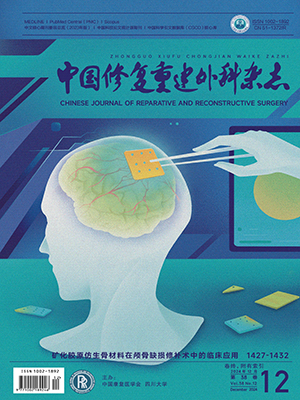Objective To study the degradable properties of 3D-SC artificial skin in vitro. Methods The 3D-SC artificial skin materials wererespectively immersed into the solutions of 0.9% normal saline (control group), pancreatic tissue liquid (experimental group 1), physiological buffer (Hanks balanced salt solution,experimental group 2) and 0.2 mol/L phosphate buffer (pH 7.4,experimentalgroup 3), and the degradation was carried out at 37℃. The quality lost ratioswere determined on the 3rd day, the 5th day, the 7th day, the 9th day, 11th dayand 14th day in the experimental group 1, while on the 3rd day, 7th day, 14th day, 15th day, 21st day and 30th day in the other groups. Results The 3D-SC artificial skin was degraded completely in pancreatic tissue liquid about within 14 days in the experimental group 1; in the control group, and in the experimental groups 2 and 3, the degradation ratios were 868%±2.30%,28.51%±10.68% and 7.35%±0.61% on the 14th day; 71.83%±2.58%, 91.32%±1.87% and 75.64%±6.13% on the 15th day, being significant difference between the control group and the experimental group 2(P lt;0.01); and 91.87%±8.15%, 95.62%±1.36% and 92.10%±2.26% on the 30th day, being no significant differences between these 3 groups(P gt;0.05), respectivelies. Conclusion The 3D-SC artificial skin materials have good degradable properties. The trend of degradation speed is from slow to quick and then to slow without enzyme.
Citation: WANG Kunyu,DAN Weihua,LI Zhiqiang,et al.. STUDY ON DEGRADABLE PROPERTIES OF 3D-SC ARTIFICIAL SKIN IN VITRO. Chinese Journal of Reparative and Reconstructive Surgery, 2005, 19(8): 658-661. doi: Copy
Copyright © the editorial department of Chinese Journal of Reparative and Reconstructive Surgery of West China Medical Publisher. All rights reserved




